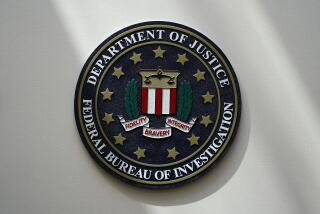3 in Britain convicted of conspiracy
- Share via
LONDON — Jurors convicted three young Britons on Monday of conspiracy to commit murder in a trial involving an alleged plot to blow up airplanes bound for North America, but they acquitted the accused ringleader and failed to reach a verdict on four other suspects.
The jury did not reach a verdict on a central allegation of the case: that the suspects planned to explode liquid bombs on seven transatlantic flights. Investigators have called the plot Al Qaeda’s most ambitious since Sept. 11, 2001. The alleged plot resulted in worldwide restrictions on liquids in carry-on luggage.
Nevertheless, Home Secretary Jacqui Smith declared that law enforcement officials had “saved countless lives” by disrupting the group on the basis of surveillance conducted by British, U.S. and Pakistani investigators. She welcomed the guilty verdicts for Abdullah Ahmed Ali, 27; Assad Sarwar, 28, and Tanvir Hussain, 27, all of Pakistani descent.
But other officials expressed disappointment, and prosecutors must now decide whether to retry four suspects, who although not convicted Monday remain in jail because they pleaded guilty to lesser charges of conspiring to cause a public nuisance. Prosecutors also have the option of seeking to retry all seven on the charge of targeting planes.
The jury deliberated for about 56 hours with time off for August vacations. The evidence included clandestine video and intercepts of the suspects in a hide-out as they filmed “martyrdom” statements, worked with explosives components, singled out flights and discussed bypassing airport security, prosecutors said.
Defendants allegedly plotted to sneak the liquid explosives aboard planes in sports drinks and other containers, and then assemble and ignite bombs that would explode when the planes were over the ocean.
The jury acquitted the alleged ringleader of the plot, Mohammed Gulzar, 27, who did not make a suicide video. Prosecutors accused him of being a senior operative who arrived from Pakistan via South Africa to take charge of the attack in its final stages.
Jurors found that Ali, Sarwar and Hussain conspired to bomb “unknown” targets, apparently based on evidence that they scouted refineries and other sites around London in addition to flights bound for the United States and Canada.
“Not to get a conviction on plotting to murder on airplanes is a bit hard to swallow,” said a British official, who spoke on condition of anonymity because he was not authorized to discuss the case publicly. “There were timetables, suicide videos, the known preference for Al Qaeda to focus on airplanes.
“Apparently juries need stronger evidence than they are getting. But when you are physically watching young Muslims known to be extremists recording suicide videos, there comes a point in a plot when you have to interfere, and run with what evidence you can get,” the official said.
The defendants denied any violent intent despite the videos they made that resembled the farewell messages filmed by suicide bombers who killed 52 people on the transport system here July 7, 2005.
During the five-month trial in Woolwich Crown Court, the defendants testified that they planned only to set off a harmless device at a terminal used by U.S. airlines to protest mistreatment of Muslims.
Also, government scientists who conducted tests for the prosecution had difficulty igniting the hydrogen peroxide mixture found in police searches, raising questions about its deadliness, officials said. And there was the perennial obstacle to prosecuting terrorism cases in Western courtrooms: Intelligence frequently cannot be used as evidence.
Within months of the arrests in August 2006, Western anti-terrorism officials said they had put together a detailed portrait of the plot. Six defendants traveled to Al Qaeda compounds in Pakistan in 2005 and 2006 to train with explosives experts led by Abu Ubaida al Masri, the network’s operations chief at the time and alleged mastermind of the London bombings, they said.
Rashid Rauf, a Briton living in Pakistan, allegedly arranged travel and training, and was the hub for communications for the alleged plot.
Pakistani police arrested Rauf at the urging of U.S. investigators who worried that a major plot was gathering steam as the fifth anniversary of the Sept. 11 attacks neared, according to Western officials. In contrast, British authorities say they wanted to continue the surveillance to gather more evidence and detect any additional plotters.
But news of Rauf’s arrest led the defendants to speed up preparations. The British official recalled the reaction at a meeting of top anti-terrorism officials here when police reported they had heard a man recording an apparent martyrdom video in the bugged house.
“A tremor went around the room,” he said. “It was believed they were on their way to martyrdom.”
Nonetheless, the jury heard little about possible Al Qaeda connections or training in Pakistan because the allegations involved activity outside Britain and were based largely on intelligence from several countries, officials say. Scotland Yard hoped to question Rauf, but he escaped from Pakistani police shortly before his expected extradition.
Restrictive rules also excluded evidence potentially linking the case to the 2005 plots against London’s public transportation system. The British official said phone records revealed extensive contact between Ali and Muktar Said Ibrahim, who was later convicted of leading a failed follow-up bombing attempt on the transport system on July 21, 2005.
Coming soon after a trial in which three alleged accomplices of the 2005 bombers were acquitted, the verdict may reinforce a sense that some Britons have that their government exaggerates the threat. The jury’s decision may also suggest sympathy for Muslims who say extremism results from alienation and injustice.
--
Stobart reported from London and Rotella from Madrid.
More to Read
Sign up for Essential California
The most important California stories and recommendations in your inbox every morning.
You may occasionally receive promotional content from the Los Angeles Times.










